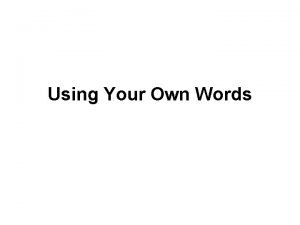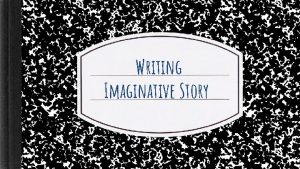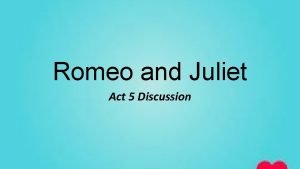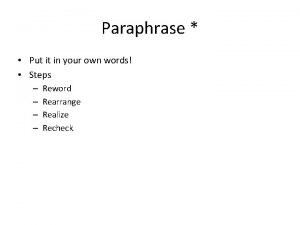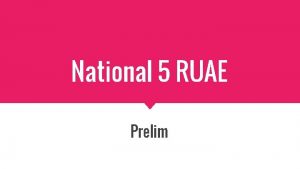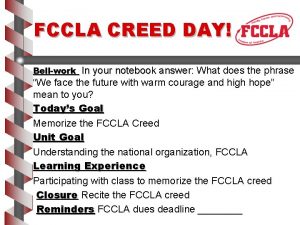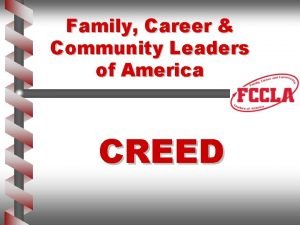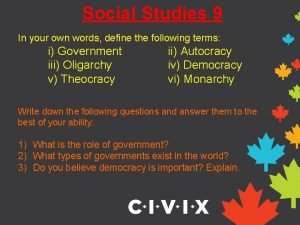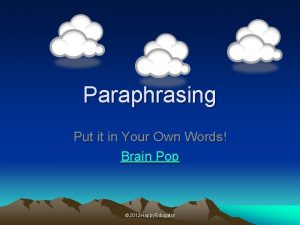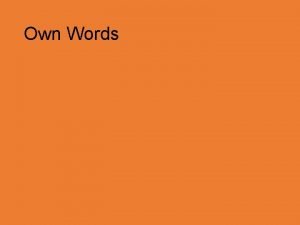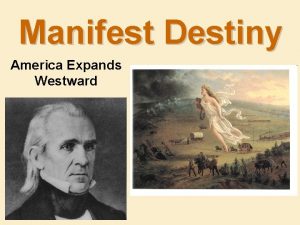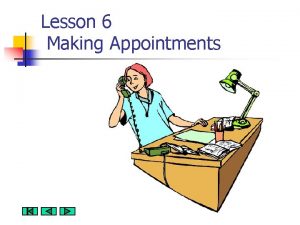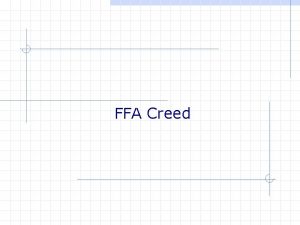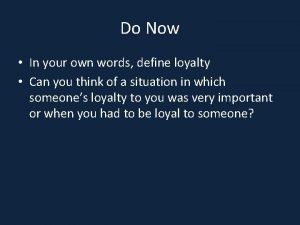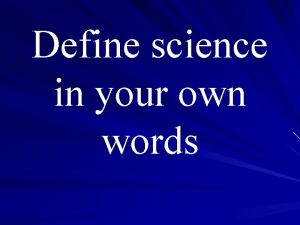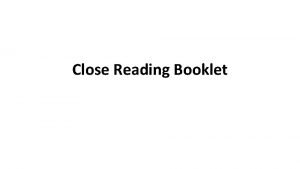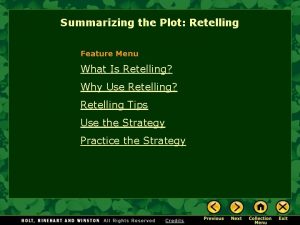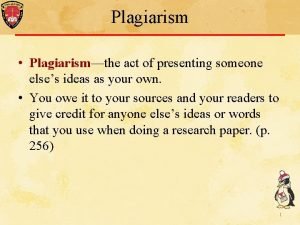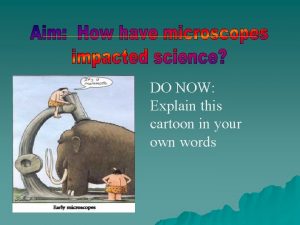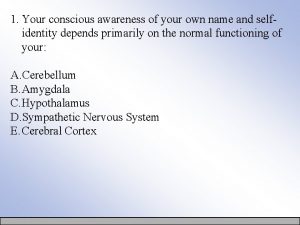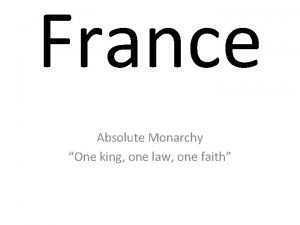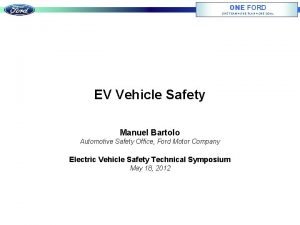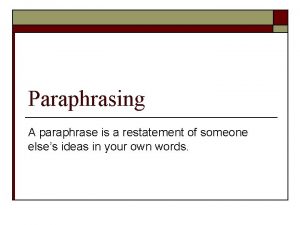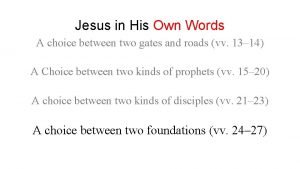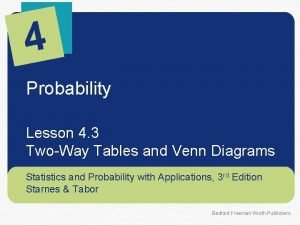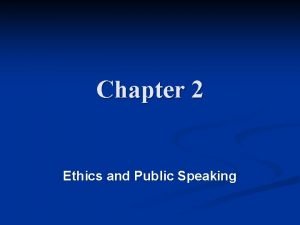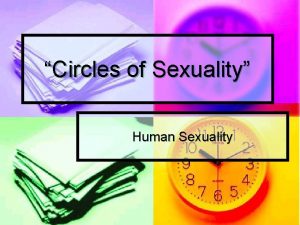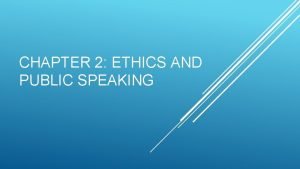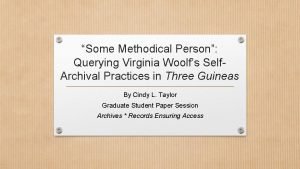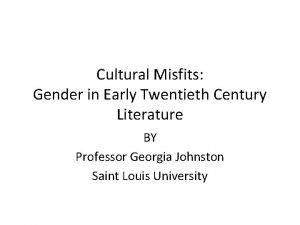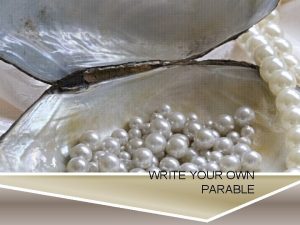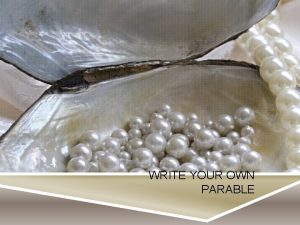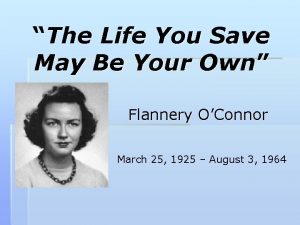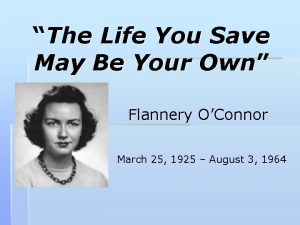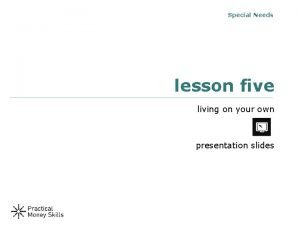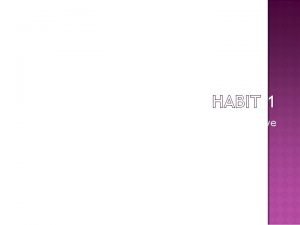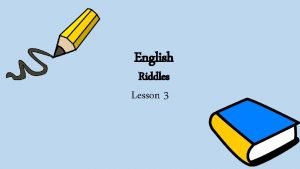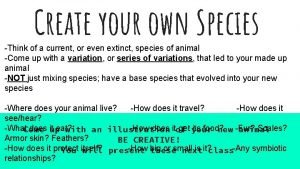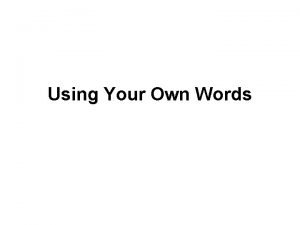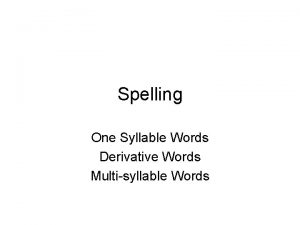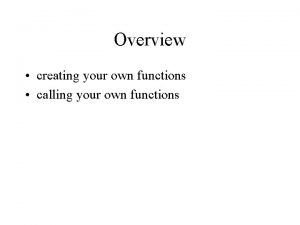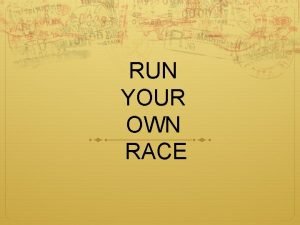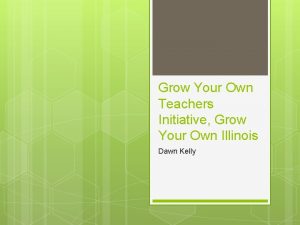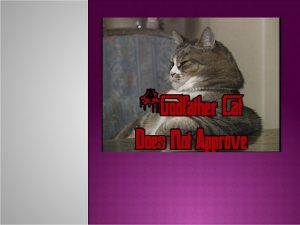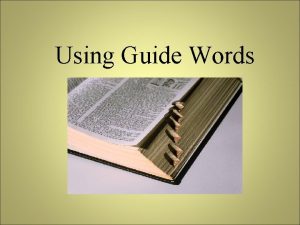Using Your Own Words One of the most




































































- Slides: 68

Using Your Own Words

One of the most important things which you have to remember to do in Close Reading is to USE YOUR OWN WORDS. Students frequently lose marks by not doing this. You must use your own words in your answers as far as possible to show that you understand what you are writing. Merely copying down the words of the passage does not show that you actually understand them.

Task 1 - Provide as many alternatives for each of the following words as you can: clever ask distorted brave instant conduct cruel friendly typical afraid quick easy crowd curious evasive

Task 2: Rewrite the following sentences using your own words: 1. I found the sum too complicated to solve. 2. The holiday was prohibitively costly – we remained here. 3. That parcel is too bulky to transport by car. 4. The man was afraid to leave. 5. She replied instantly.

So, how do we put these skills into practice to answer In Your Own Words Questions?

Using Your Own Words - Strategy Look at the following question: When Mr Bilbo Baggins of Bag End announced that he would shortly be celebrating his eleventy-first birthday with a party of special magnificence, there was much talk and excitement in Hobbiton. Lord of the Rings In your own words, explain what kind of party Bilbo intended to hold.

Using Your Own Words - Strategy First, read through the sentence until you see the phrase which describes the party: Second, come up with a word / phrase / expression which is as close as possible to the meaning of the word(s) in the passage: Third, write your answer: When Mr Bilbo Baggins of Bag End announced that he would shortly be celebrating his eleventy-first birthday with a party of special magnificence, there was much talk and excitement in Hobbiton. Unusual? Particularly? Splendour? Extravagance? Bilbo’s party was going to be unusually splendid.

Now do this one yourself: Explain, in your own words, what effect the party’s announcement had in Hobbiton. 1 Identify the relevant part of the passage. 2 Translate each part in your own words. 3 Write your answer When Mr Bilbo Baggins of Bag End announced that he would shortly be celebrating his eleventy-first birthday with a party of special magnificence, there was much talk and excitement in Hobbiton. a lot of conversation enthusiasm, eager anticipation The announcement resulted in a lot of conversation as people eagerly anticipated the party.

Using Your Own Words questions Strategy 1 Identify the relevant part of the passage 2 Translate each part in your own words 3 Write your answer

Now we are going to look at a worked example of how to answer an In Your Own Words Questions.

For example: A question asks you what made the Eiffel Tower a worthwhile tourist attraction. The answer is in the following sentence: ‘At the Eiffel Tower you get the excitement of the lift and an incredible view. ’ The answer is the phrase ‘an incredible view’, but how could you put this in your own words? In your answer you should not repeat this phrase exactly. Instead, you could say: ‘a wonderful panorama’ or ‘you can see a long way from the top’. You do not need to repeat the words of the question in your answer – this wastes time.

Look at the following question: Explain clearly why the writer ‘wandered down the Mississippi’ in his boat. The answer is in the following sentence: 2 U ‘It was the only possible way of encountering a great river at close quarters. ’ If you simply copied out this sentence you would gain no marks. The following answers to this question would gain 2, 1 or 0 marks. Decide what marks you think each would get and why. a) He wanted to see the river at close quarters. b) He could get to know the river well by seeing it from up close. c) The writer wandered down the Mississippi in his boat as it was the only possible way to go.

Explain clearly why the writer ‘wandered down the Mississippi’ in his boat. 2 U ‘It was the only possible way of encountering a great river at close quarters. ’ a) He wanted to see the river at close quarters. b) He could get to know the river well by seeing it from up close. c) The writer wandered down the Mississippi in his boat as it was the only possible way to go. a) This answer gets 1 mark. The first part of the answer is correct and put into the candidate’s own words, and thus gains 1 mark, but the second part of the answer is ‘lifted’ from the text and is worth 0 marks.

Explain clearly why the writer ‘wandered down the Mississippi’ in his boat. 2 U ‘It was the only possible way of encountering a great river at close quarters. ’ a) He wanted to see the river at close quarters. b) He could get to know the river well by seeing it from up close. c) The writer wandered down the Mississippi in his boat as it was the only possible way to go. b) This answer gains 2 marks, since both the idea of ‘encounter’ and ‘at close quarters’ are put into the candidate’s own words.

Explain clearly why the writer ‘wandered down the Mississippi’ in his boat. 2 U ‘It was the only possible way of encountering a great river at close quarters. ’ a) He wanted to see the river at close quarters. b) He could get to know the river well by seeing it from up close. c) The writer wandered down the Mississippi in his boat as it was the only possible way to go. c) This answer gains 0 marks, as it does not contain either of the ideas of ‘encounter’ or ‘at close quarters’. There is no need to repeat the words of the question.

Now try the following questions, using the ‘How to answer’ advice to help you.

Insects are an occupational hazard at a dig, and for some reason there are more flies higher up the mountain where she is working than at the main excavation site lower down. 1. “Insects are an occupational hazard. . . ” Explain in your own words what this means. (2) How to answer: Danger / problem / difficulty (1) Translate “hazard”: __________________ Linked to job (1) Translate “occupational”: _______________

Alice clutches desperately at the bushes and scrub to stop herself slipping any further. For a moment she lies sprawled in the dirt, dizzy and disorientated. As it sinks in how very close she came to being crushed, she turns cold. Takes a deep breath. Waits for the world to stop spinning. 2. In your own words, explain why Alice “turns cold”. (2) How to answer: Highlight the answer in the text. Write both parts of it below: “it sinks in” “how very close she came to being crushed” a) _______ b) __________________ Now translate the answer into your own words: Realises (or similar) (1) a) __________________________ She nearly died (or similar) (1) b) __________________________

Feeling nervous and slightly guilty, Alice wraps the buckle in a handkerchief and pushes it into her pocket, then cautiously steps forward. 3. As Alice steps into the tunnel, she experiences two feelings. In your own words, explain what these two feelings are. How to answer: Highlight the answer in the text. Write both parts of it below: “guilty” “nervous” a) _______ b) _______ Now translate the answer into your own words: Anxious / scared (or similar) (1) a) __________________________ Feels she is doing something wrong (or similar) (1) b) __________________________

It’s so easy when they’re puppies. You stroll down the street and they come home exhausted. People stop and have conversations. “Aren’t you gorgeous? ” (That can be disappointing, of course: it’s the dog who is being addressed, not you). Then they get bigger. They want proper walks. They want sticks thrown. We got a mongrel terrier pup from a rescue centre. And when Wilf reached full size, I started looking to take him for a decent walk in deep countryside—a rite of passage for a young hound, somewhere beyond the realm of the dreaded poo bin. There were two teenage sons too, Con and Niall, and they seemed surprisingly enthusiastic—there’s one tip for getting your kids to walk: buy or borrow a dog. 4. Why is it more difficult to care for an older, bigger dog? Use your own words in your answer. How to answer: Highlight the answer in the text. Write both parts of it below: ‘want proper walks’ ‘want sticks thrown’ a)____________ b) ____________ Now translate the answer into your own words: need more exercise (1) need to be entertained (1) a)____________ b) ____________

I have this fond vision of dogs in hotels and pubs. It’s an affable labradortype creature laid out under the table, snoozing. At the hotel, Wilf isn’t like that. He runs riot. He loves hotels. He loves the way people drop crisps in the bar. He sneaks into a neighbour’s room and sniffs their luggage for food. Curiously, they laugh indulgently and say things like, “You’re a lovable chap, aren’t you? ” A dog’s life doesn’t seem so bad, really. Wilf soon settles down on his dedicated luxury bed and sleeps like a baby. I spend the night halfawake, stirring at every doggy snort, worrying that he’ll get up and cock his leg on the four-poster. Mercifully that doesn’t happen. 5. Describe the writer’s “vision” of how dogs should behave in pubs and hotels. Use your own words in your answer. (2) How to answer: Highlight the answer in the text. Write both parts of it below: a) ___________ ‘affable’ b) __________________ ‘laid out under the table, snoozing’ Now translate the answer into your own words: eg friendly/relaxed (1) eg (lying down) asleep / a) _____________ b) _______________ unobtrusive / no trouble (1)

The following questions are taken from the 2014 National 5 RUAE paper

So we are not here to examine our children. What we should do is try to find out where we have gone so terribly wrong. Before we come to the wretchedly indulgent state of modern parenting, though, I suppose I’d better set out my stall. Inevitably, when one becomes a parent, one can’t help revisiting one’s own childhood to make comparisons. 6. Look at line 9, where the writer gives the view that, nowadays, parents “have gone…terribly wrong”. Explain in your own words what the writer goes on to say has gone wrong. (2) How to answer: Highlight the answer in the text. Write both parts of it below: “wretchedly” a) ____________ b) ____________ “indulgent” Now translate the answer into your own words: eg appallingly / dreadfully / extremely / shamefully – ie appreciation a) _______________________________ of the intensifying function of “wretchedly” (1)____________________ eg (over-) tolerant / libertarian / lenient / non-disciplinarian b) ____________________________ (accept colloquial “soft”)(1) ____________________________ • Award 1 mark for reference to “revisiting one’s own childhood” (eg comparing one’s own childhood)

The next question was regarded as being quite controversial, but let’s look at how you would work out the answer: Question: 2. Look at lines 45 – 47. Explain what is meant by the expression “benign neglect”, and explain what is surprising about this expression. (3) Where might you have heard the term ‘benign’ before? When a tumour is analysed for signs of cancer it is described as being either ‘malignant’ i. e. cancerous and therefore dangerous or ‘benign’ i. e. not cancerous and therefore usually not dangerous.

The next question was regarded as being quite controversial, but let’s look at how you would work out the answer: Question: 2. Look at lines 45 – 47. Explain what is meant by the expression “benign neglect”, and explain what is surprising about this expression. (3) What about “neglect”? If someone neglects something then they don’t look after it as well as they should. Bear these ideas in mind as we find the phrase in the passage and then look at the paragraphs before it to see if they can help us to work out its meaning in this context.

We never had friends round for “playdates”. Keeping children busy and happy was not a parental priority. If we were bored, that was our own fault. In fact, there was nothing to do for weeks on end except rake leaves (my father once made us spend a whole half-term raking leaves) and read on our beds. Occasionally my mother would shout up the stairs: “Stop reading!” Imagine that now, when children are on their laptops in their rooms, looking at. . . I don’t even want to imagine. As for school, well, reports were read, not dwelt upon, as they were not parents’ business, but ours. As for parental involvement, all I can tell you is that my father’s proudest boast as a parent is that he never, once, attended a parentteacher meeting at any one of our schools. It never did me any harm, but still, I can’t repeat this sensible, caring regime of character-building, toughening, benign neglect for my own children. . . and nor, it appears, can anyone else. Now examples of “wet parenting” abound. 7. Explain what is meant by the expression “benign neglect”, and explain what is surprising about this expression. (3) So, is there anything here that can help us?

So, is there anything here that can help us? • “Keeping children busy and happy was not a parental priority. If we were bored, that was our own fault. ” • “Occasionally my mother would shout up the stairs: “Stop reading!” • “…school…reports were read, not dwelt upon, as they were not parents’ business, but ours. ” • “As for parental involvement…my father’s proudest boast as a parent is that he never, once, attended a parent-teacher meeting at any one of our schools. ” • “It never did me any harm…this sensible, caring regime of characterbuilding, toughening, benign neglect for my own children” “benign neglect” translated into your own words: “benign” (eg kind / caring / compassionate / well-meant) (1) a) ____________________________ “neglect” (eg ignoring / leaving alone / not paying attention to, but b) ____________________________ synonym should not have critical connotation) (1);

“benign neglect” translated into your own words: a) ____________________________ “benign” (eg kind / caring / compassionate / well-meant) (1) “neglect” (eg ignoring / leaving alone / not paying attention to, but b) ____________________________ synonym should not have critical connotation) (1); The question asks you to: Explain what is meant by the expression “benign neglect”, and explain what is surprising about this expression. (3) To get the third mark you would have to comment on: (idea of) paradox /oxymoron / contrast (1) Also: You could give “tough love” as a condensed answer paraphrasing both adjectives (2) Refer to the contrast in the writer’s life (1)

In my lifetime, parenthood has undergone a terrifying transition. Becoming a mother or father is no longer something you just are. It is something you do, like becoming a vet—complete with training courses, parenting vouchers, government targets and guidelines, and a host of academics and caring professionals (as well as their websites, and telephone helplines) on hand 24/7 to guide you through what to expect when your twentysomethings return home. 8. Explain as far as possible in your own words what similarities the writer sees between “Becoming a mother or father” and “becoming a vet”. (2) How to answer: Highlight two answers in the text. Write both of them down: Now translate both answers into your own words: ________________________________ • undergoing training / going on courses / taking classes in it • aims imposed by government / rules • childcare vouchers ________________________________ • professional advice / support eg online sources of advice ________________________________________________________________ � idea of multiplicity of activities • idea of constantly being on duty • idea of diversity of activities � idea of bureaucratic vigilance ________________________________ Note that “job” alone is too vague/loose

The final question in the 2014 paper is worth 5 points: 9. In this article, the writer points out several differences between parenting and childhood when she was little and parenting and childhood now (she refers to “a terrifying transition”, line 61). As far as possible in your own words, summarise what some main differences are. (5) ‘Summarise’ means that you have to sum up / write a shorter version of the points in your own words.

How to answer: a) Read through the whole article b) Highlight features of parenting / childhood when the author was little in one colour. c) Highlight features of parenting / childhood now in a different colour.

Hey, parents, leave those kids alone. In many ways, nothing changes. We love our children. We want our children to grow up to be competent, decent human beings fit for adult purpose. These are the main things, and in these we have, I think we are all agreed, not done too badly. Our children, and I’ll generalise here, are not serial axe murderers or kitten drowners. Our children do make an effort — at least on special occasions anyway — to repay the enormous investment of time, energy, money and emotion we have poured into them. Children are programmed to please, to be loved, and to love us back.

So we are not here to examine our children. What we should do is try to find out where we have gone so terribly wrong. Before we come to the wretchedly indulgent state of modern parenting, though, I suppose I’d better set out my stall. Inevitably, when one becomes a parent, one can’t help revisiting one’s own childhood to make comparisons. When I was little, we were given no choices — about what we ate, what we wore, what we did, where we went to school, when we went to bed etc. I could only choose what to read. There was not so much stuff (many of my son’s 15 -year-old friends have i. Pods, i. Pads, Mac. Books, unlimited access to their parents’ credit cards, Pay Pal, e. Bay and i. Tunes accounts — and not just i. Phones, but Black. Berrys too), so we made our own fun.

Our parents provided us with the essentials, then got on with their own lives. Which makes me realise that my parents were brilliant, not for what they did, but more for what they didn’t do. So we were fed, we were clothed, we were loved, and we had all the books we could read. But there was not the expectation of having every wish granted, as there is now, and that is the best thing that my parents could ever have given us. I remember only once going to a restaurant in the UK. It was a motorway café on the A 303. My father told us, wincing as he looked at the laminated text, with its stomach-churning pictograms, that we could have the spag bol. From the children’s menu. We had a TV, but as we lived in Belgium there was nothing to watch apart from two American sitcoms, which came on only once a week.

My parents were so hard up that when we went to England for holidays on the family farm on Exmoor — mainly spent “wooding” for winter fuel on rainswept hillsides — my father would invariably book cheap overnight ferry crossings from the Continent. He would never shell out for a cabin, despite the 1 am or 3 am departure slots. Instead, he would tell us to go to sleep in the back of the car, parked in the lower deck, where we would eventually pass out from suffocation or diesel fumes. We never had friends round for “playdates”. Keeping children busy and happy was not a parental priority. If we were bored, that was our own fault. In fact, there was nothing to do for weeks on end except rake leaves (my father once made us spend a whole half-term raking leaves) and read on our beds. Occasionally my mother would shout up the stairs: “Stop reading!” Imagine that now, when children are on their laptops in their rooms, looking at. . . I don’t even want to imagine.

As for school, well, reports were read, not dwelt upon, as they were not parents’ business, but ours. As for parental involvement, all I can tell you is that my father’s proudest boast as a parent is that he never, once, attended a parent-teacher meeting at any one of our schools. It never did me any harm, but still, I can’t repeat this sensible, caring regime of character-building, toughening, benign neglect for my own children. . . and nor, it appears, can anyone else. Now examples of “wet parenting” abound. We also live in a world where a manic mum calls herself a Tiger Mother and writes a bestselling book by the same name about how to produce straight-A, violin-playing, tennis-champ, superkids, and where pushy, anxious helicopter parents hover every school. A friend reports that when her son was due to visit the Brecon Beacons on a school camping trip this summer, three mothers pulled out their sons because the weather forecast was “rainy”.

University dons are also complaining of a traumatic level of parental over-involvement just at the exact moment that mummies and daddies are supposed to be letting go. It was the complete opposite in my day. When I was on my gap year, I called my father from Israel in September and told him I’d decided not to take up my place at university. I announced that I wanted to stay in Galilee with a handsome local shepherd. For ever. My father didn’t miss a beat. “Great scheme!” he cried, astutely divining that if he approved the plan, I would never carry it out.

In my lifetime, parenthood has undergone a terrifying transition. Becoming a mother or father is no longer something you just are. It is something you do, like becoming a vet—complete with training courses, parenting vouchers, government targets and guidelines, and a host of academics and caring professionals (as well as their websites, and telephone helplines) on hand 24/7 to guide you through what to expect when your twentysomethings return home. Parenting has become subsidised and professionalised, even though anyone can (and, frankly, does) have a baby, after which they become parents. I love being a parent, most of the time anyway, but we should immediately de-professionalise it, on the grounds that: one, it’s unpaid; and two, thanks to the economy, lack of housing and jobs etc, you never get to retire.

In order to get 5 marks you have to recognise and restate five key points with at least one from each side (i. e. then and now). You can repeat points made in previous answers. Summarise 5 of the key points which you have highlighted, using your own words.

Possible Answers: THEN: Gloss of… “we were given no choices” For example… “There was not so much stuff” children had fewer possessions “we made our own fun” “Our parents provided us with the essentials” “then got on with their own lives” children entertained themselves care was basic, parents were not so generous children were not given options / consulted parents were more remote / hands-off

Possible Answers: THEN: Gloss of… “There was not the expectation of having every wish granted” “My parents were so hard up” For example… “Keeping children busy and happy was not a parental priority” Lack of school “involvement” parents’ first concern was not their children’s pleasure children did not anticipate being given everything they wanted reference to spartan holiday travel and activities little attention paid to reports, non-attendance at meetings

Possible Answers: THEN: Gloss of… “It was the complete opposite in my day” For example… Lack of involvement in life post school / at university “Becoming a mother or father is no People discovered what to do as they went alonger something you just are”

Possible Answers: NOW: Gloss of… For example… “wretchedly indulgent state of modern parenting” “many of my son’s 15 -year-old friends have i. Pods, i. Pads, Mac. Books … Pay Pal, e. Bay and i. Tunes accounts” “unlimited access to their parents’ credit cards” “I can't repeat this sensible regime …” parents are excessively lenient / lax / soft children have many / a variety of modern devices children are given a great deal of / excessive financial extravagance parents are unable to be as removed as hers were

Possible Answers: NOW: Gloss of… “examples of ‘wet parenting’ abound” For example… there are many instances of excessive / over-indulgent / overprotective behaviour “(traumatic level of) parental over- parents are too concerned / involvement just at the exact interfering / hands-on when their moment that mummies and children are older daddies are supposed to be letting go ” “Parenting is something you do … parents now are more rule-bound / have more people telling them has become subsidised and what to do professionalised”

NB allow inferable opposites where appropriate, but do not give credit twice for repetition of comment on the same aspect of parenthood

Further Practice

USING YOUR OWN WORDS APPROACH: Look at how many marks are available Find the answer in the passage and underline / highlight it Express the underlined information using your own words. Remember not to change the original meaning.

Context: This is an extract from an article written around the time that an exhibition of the warriors from ancient Chinese Terracotta Army was on display in the British Museum in London. Qin Shi Who? My reaction entirely. I had heard of the Terracotta Army, of course. I had even seen some of them when a vanguard of warriors came to London in the 1980 s. But I couldn’t have told you who Qin Shihuangdi was. That probably goes for the vast majority of people in the West. And given that he is one of the most colossal figures ever to have walked the earth, that is rather shocking. For Qin Shihuangdi, its First Emperor, created China more than two millennia ago, establishing the world’s longest-lasting empire. A visionary, a brutal tyrant and a megalomaniac, he is the greatest historical figure that most of us have never heard of.

Qin Shi Who? My reaction entirely. I had heard of the Terracotta Army, of course. I had even seen some of them when a vanguard of warriors came to London in the 1980 s. But I couldn’t have told you who Qin Shihuangdi was. That probably goes for the vast majority of people in the West. And given that he is one of the most colossal figures ever to have walked the earth, that is rather shocking. For Qin Shihuangdi, its First Emperor, created China more than two millennia ago, establishing the world’s longest-lasting empire. A visionary, a brutal tyrant and a megalomaniac, he is the greatest historical figure that most of us have never heard of. 1. In your own words give two reasons why it is “rather shocking” that most people in the West do not know about Qin. (2) GLOSS OF: “colossal” or “greatest” - He is a very important person in history - He set up / founded China “created” - He set up / founded an imperial dynasty “First Emperor” “world’s longest-lasting” - His regime was the most permanent / durable / prolonged Any two

Context: In this passage, the writer explores some of the reasons for the popularity of reality TV shows such as “The X Factor”. In a world increasingly dominated by Facebook and Twitter, where friendships are made and broken at the click of the computer mouse, we feel more comfortable engaging with someone on the other side of the screen rather than chatting to them over the garden fence, as our grandparents might have once done. If we are already sharing the details of our private lives in tweets and status updates, are we also becoming more accustomed to the notion of putting our intimate selves on display for the entertainment of others?

In a world increasingly dominated by Facebook and Twitter, where friendships are made and broken at the click of the computer mouse, we feel more comfortable engaging with someone on the other side of the screen rather than chatting to them over the garden fence, as our grandparents might have once done. If we are already sharing the details of our private lives in tweets and status updates, are we also becoming more accustomed to the notion of putting our intimate selves on display for the entertainment of others? 2. In your own words, explain what is meant by “engaging with someone on the other side of the screen”. (2) This means to form a relationship of some kind with another person online via social media (1) rather than face to face. (1)

Context: In this passage, the writer explores some of the reasons for the popularity of reality TV shows such as “The X Factor. The most memorable reality TV contestants almost always have a back story of personal triumph over adversity which enables us to feel that we are helping them to succeed, that we are giving them a break when no-one else will. And perhaps this is why Susan Boyle, who grew up in a council house and was bullied as a child for her learning difficulties, has proved such an enduring figure.

The most memorable reality TV contestants almost always have a back story of personal triumph over adversity which enables us to feel that we are helping them to succeed, that we are giving them a break when no-one else will. And perhaps this is why Susan Boyle, who grew up in a council house and was bullied as a child for her learning difficulties, has proved such an enduring figure. 3. In your own words explain why the writer chooses Susan Boyle as an example of someone who is an “enduring figure”. (2) “grew up in a council house” - She came from a relatively poor background “bullied as a child for her learning difficulties” - She was picked on when she was young for having intellectual disabilities

Context: This is an extract from an article about an activity called ‘parkour’. This involves running through cities and leaping over obstacles. As an underground phenomenon involving running through cities and leaping over obstacles, parkour is the epitome of cool for its growing army of fans. Participants are known as traceurs (or traceuses for females) and the parks and city structures of Scotland are rapidly becoming their stage. “I really like the ability to move in the way you want, rather than being bound by the way the street designer wants you to move, ” says Glynn Forsythe (24), one of the traceurs assessing the obstacles dotting the campuses of Strathclyde University. “It might be faster to go across that railing than to take the path. I like that, ” he says. “It makes things interesting. ” There are no rules and no projected outcomes; parkour simply advocates that individuals “find their own way”. The aim is to improve strength, both physical and mental, while developing your technique to overcome even greater barriers.

As an underground phenomenon involving running through cities and leaping over obstacles, parkour is the epitome of cool for its growing army of fans. Participants are known as traceurs (or traceuses for females) and the parks and city structures of Scotland are rapidly becoming their stage. “I really like the ability to move in the way you want, rather than being bound by the way the street designer wants you to move, ” says Glynn Forsythe (24), one of the traceurs assessing the obstacles dotting the campuses of Strathclyde University. “It might be faster to go across that railing than to take the path. I like that, ” he says. “It makes things interesting. ” There are no rules and no projected outcomes; parkour simply advocates that individuals “find their own way”. The aim is to improve strength, both physical and mental, while developing your technique to overcome even greater barriers. 4. Using your own words, give two reasons why parkour appeals to Glynn Forsythe. (2) • Reference to freedom eg you can go where you choose rather than where planners want you to go (1) • Reference to speed eg you can move more quickly by using alternative routes (1) • Gloss of “interesting” ie. less dull / less boring

Context: This is an extract from a passage where the writer informs us about the effect that books by Charles Dickens, a 19 th-century English writer, had on black South African children during the time of racial segregation (“apartheid”) in South Africa. (Afrikaans is the language used by white South Africans who were descended from Dutch settlers. ) Hector Pieterson was 12 when he died. Today a museum bearing his name commemorates his death—and hundreds of others—which occurred some 30 years ago at a place whose name has come to symbolise uprising against oppression: Soweto. Hector was one of thousands of black children who took to the streets on June 16, 1976, in protest about schooling under the apartheid regime in South Africa. When police opened fire on the march it brought the word Soweto to the attention of the world. But less well known is the role that Charles Dickens played in events. The march was in protest at a government edict making Afrikaans compulsory in schools. From January 1976, half of all subjects were to be taught in it, including ones in which difficulties of translation were often an issue.

Hector Pieterson was 12 when he died. Today a museum bearing his name commemorates his death—and hundreds of others—which occurred some 30 years ago at a place whose name has come to symbolise uprising against oppression: Soweto. Hector was one of thousands of black children who took to the streets on June 16, 1976, in protest about schooling under the apartheid regime in South Africa. When police opened fire on the march it brought the word Soweto to the attention of the world. But less well known is the role that Charles Dickens played in events. The march was in protest at a government edict making Afrikaans compulsory in schools. From January 1976, half of all subjects were to be taught in it, including ones in which difficulties of translation were often an issue. 5. Explain, in your own words, what the marchers were objecting to. (2) gloss of “edict” A Government rule / law / decree / statute / order (1) gloss of “compulsory” forcing / making it obligatory / enforcing / requiring teaching in Afrikaans (1)

SUMMARISING APPROACH: Look at the number of marks on offer Underline / highlight the main points Put the points into your own words (without losing the original meaning) Avoid writing down details of secondary importance

Context: This is an extract from an article in the Scotsman about Elizabeth Taylor, a famous actress in the 50 s and 60 s. Of course, those born in the 1970 s may find celebrity on the Taylor scale hard to understand. The whole concept of celebrity has been degraded, over the last two centuries by an avalanche of media coverage which makes no pretence of interest in the actual work that well-known people do, but instead focuses entirely and insidiously on the personal lives, and most particularly the personal appearance, of anyone who has ever been in the public eye for anything, from behaving like an idiot on reality TV, to having sex with a premiership footballer.

Of course, those born in the 1970 s may find celebrity on the Taylor scale hard to understand. The whole concept of celebrity has been degraded, over the last two centuries by an avalanche of media coverage which makes no pretence of interest in the actual work that well-known people do, but instead focuses entirely and insidiously on the personal lives, and most particularly the personal appearance, of anyone who has ever been in the public eye for anything, from behaving like an idiot on reality TV, to having sex with a premiership footballer. 1. What three main criticisms does the writer make of the way the media treat celebrities today? (3) 1) The media are not interested in the careers / professional lives of celebrities 2) They are only interested in their private lives, in an unpleasant / damaging / intrusive way 3) They are especially obsessed with celebrities’ looks / bodies

Context: This is an extract from an article in which the writer identifies factors which she feels ‘contribute to a real sense of traditional family life in meltdown’. The first is the relative ease of divorce, which, particularly for low income families – removes the ancient pressure on women to put up with bad marriages for the sake of respectability. Unhappy wives are now free to leave with their children, a freedom which some men deeply resent. The second is the growing number of society, and collapse of traditional communities which often leaves the children of broken marriages without a support system of neighbours and relatives to cushion the blow. And the third is the remarkably unreconstructed workplace culture within which British parents still have to function, tolerating chromic loss of earnings and status if they make family life a priority, and often having to work unacceptably long hours if they want to remain in employment at all.

The first is the relative ease of divorce, which, particularly for low income families – removes the ancient pressure on women to put up with bad marriages for the sake of respectability. Unhappy wives are now free to leave with their children, a freedom which some men deeply resent. The second is the growing number of society, and collapse of traditional communities which often leaves the children of broken marriages without a support system of neighbours and relatives to cushion the blow. And the third is the remarkably unreconstructed workplace culture within which British parents still have to function, tolerating chromic loss of earnings and status if they make family life a priority, and often having to work unacceptably long hours if they want to remain in employment at all. 2. Summarise three factors which the writer identifies as possible causes of the breakdown of family life. (3) 1. It is far easier to get a divorce now and women can keep their kids, which means that women no longer feel forced to stay in unhappy marriages due to a lack of money

The first is the relative ease of divorce, which, particularly for low income families – removes the ancient pressure on women to put up with bad marriages for the sake of respectability. Unhappy wives are now free to leave with their children, a freedom which some men deeply resent. The second is the growing number of society, and collapse of traditional communities which often leaves the children of broken marriages without a support system of neighbours and relatives to cushion the blow. And the third is the remarkably unreconstructed workplace culture within which British parents still have to function, tolerating chromic loss of earnings and status if they make family life a priority, and often having to work unacceptably long hours if they want to remain in employment at all. 2. Summarise three factors which the writer identifies as possible causes of the breakdown of family life. (3) 2. Due to changes in society, the children of single parents do not have the same help from those around them as they used to have.

The first is the relative ease of divorce, which, particularly for low income families – removes the ancient pressure on women to put up with bad marriages for the sake of respectability. Unhappy wives are now free to leave with their children, a freedom which some men deeply resent. The second is the growing number of society, and collapse of traditional communities which often leaves the children of broken marriages without a support system of neighbours and relatives to cushion the blow. And the third is the remarkably unreconstructed workplace culture within which British parents still have to function, tolerating chronic loss of earnings and status if they make family life a priority, and often having to work unacceptably long hours if they want to remain in employment at all. 2. Summarise three factors which the writer identifies as possible causes of the breakdown of family life. (3) 3. Parents in Britain cannot afford to work less in order to spend more time with them.

Context: This is an extract from an article focusing on whether prison is the correct place for young people who commit crimes. “Hari, I am in prison, call me in a minute. ” I was standing in a garden centre when I received the message – an unlikely one for a middle-aged, middleclass woman to receive while choosing a rosebush. Tuggy Tug is the leader of a Brixton gang whom I befriended two years ago. Now he has been arrested for stealing mobile phones. He has just turned eighteen and this was his first time ‘in a big man’s prison’. His voice turned desperate: “Why aren’t you picking up your phone, Hari? ”

“Hari, I am in prison, call me in a minute. ” I was standing in a garden centre when I received the message – an unlikely one for a middle-aged, middleclass woman to receive while choosing a rosebush. Tuggy Tug is the leader of a Brixton gang whom I befriended two years ago. Now he has been arrested for stealing mobile phones. He has just turned eighteen and this was his first time ‘in a big man’s prison’. His voice turned desperate: “Why aren’t you picking up your phone, Hari? ” 3. Summarise, in your own words, two reasons why this was an unusual call for Hari to receive. (2) 1. You would not expect an older, respectable woman to receive a phonecall from someone in prison 2. Where she was at the time - buying a plant for her garden

Context: This is an extract from an article where the writer explores some of the reasons for the popularity of reality shows such as “The XFactor”. It’s no coincidence that our love affair with The X-Factor is so potent right now, more than ever before, as Britain endures a period of relative austerity. In a time of economic hardship, we are seeking out the simple and cheap – family entertainment that makes us feel part of something bigger. But the popularity of such shows may be traced back even further – to the emergence of nineteenth century periodical which relied on reader contributions. Reality TV is merely a manifestation of a very, very old craving. We love sentimental stories such as Dickens’ Little Nell; we love a tear jerker, and shows like The X Factor are no more crass and exploitative than nineteenth century fiction.

It’s no coincidence that our love affair with The X-Factor is so potent right now, more than ever before, as Britain endures a period of relative austerity. In a time of economic hardship, we are seeking out the simple and cheap – family entertainment that makes us feel part of something bigger. But the popularity of such shows may be traced back even further – to the emergence of nineteenth century periodical which relied on reader contributions. Reality TV is merely a manifestation of a very, very old craving. We love sentimental stories such as Dickens’ Little Nell; we love a tear jerker, and shows like The X Factor are no more crass and exploitative than nineteenth century fiction. 4. Summarise the two main reasons that the writer gives in this paragraph for “our love affair with The X Factor”? (2) 1. It doesn’t cost anything during a time when many people have money worries and it creates a sense of participating in a large event 2. We enjoy watching contestants reveal their emotional pasts / sob stories
 Using your own words
Using your own words In your notebook define the following terms in your words
In your notebook define the following terms in your words What type of sae is when you own your own business
What type of sae is when you own your own business Describing a kitchen in writing
Describing a kitchen in writing Imaginative story
Imaginative story Making new words your own lesson 20
Making new words your own lesson 20 Higher ruae question types
Higher ruae question types Describe them briefly
Describe them briefly Description in your own words
Description in your own words Who is present when juliet awakens
Who is present when juliet awakens Put this in my own words
Put this in my own words National 5 ruae
National 5 ruae Explain the fccla creed in your own words
Explain the fccla creed in your own words Creed of fccla
Creed of fccla Define acceleration
Define acceleration Oligarchy examples
Oligarchy examples Put in your own words
Put in your own words Quote summarizer
Quote summarizer Define manifest destiny in your own words.
Define manifest destiny in your own words. Making new words your own lesson 2
Making new words your own lesson 2 Intramural program meaning
Intramural program meaning Paragraph 5 of the ffa creed
Paragraph 5 of the ffa creed Loyalty in your own words
Loyalty in your own words View from the window at le gras
View from the window at le gras Define science in your own words
Define science in your own words In your own words questions
In your own words questions Duffy's jacket summary
Duffy's jacket summary Presenting someone else's words or ideas as your own is
Presenting someone else's words or ideas as your own is Compound light microscope cartoon
Compound light microscope cartoon Are entrepreneur born or made
Are entrepreneur born or made Your conscious awareness of your own name and self identity
Your conscious awareness of your own name and self identity I was most unhappy with the service
I was most unhappy with the service One god one empire one religion
One god one empire one religion Little dog run
Little dog run One king one law one faith
One king one law one faith One god one empire one emperor
One god one empire one emperor One ford behaviors
One ford behaviors See one do one teach one
See one do one teach one One price policy
One price policy Night structure
Night structure Studiendekanat uni bonn
Studiendekanat uni bonn Asean tourism strategic plan
Asean tourism strategic plan Graphic organizer with the aims of la liga filipina
Graphic organizer with the aims of la liga filipina Are you ever burdened with a load of care
Are you ever burdened with a load of care Give us your hungry your tired your poor
Give us your hungry your tired your poor Mother teresa in my own words
Mother teresa in my own words Students frequently overuse direct quotation
Students frequently overuse direct quotation Jesus in his own words
Jesus in his own words In one large city 40 of all households own a dog
In one large city 40 of all households own a dog What is incremental plagiarism
What is incremental plagiarism Circle of sexuality
Circle of sexuality What are the five guidelines for ethical speechmaking
What are the five guidelines for ethical speechmaking Methodical person
Methodical person Room of one's own
Room of one's own Got my own
Got my own Write a parable
Write a parable My own parable
My own parable The life you save
The life you save Situational irony in the life you save may be your own
Situational irony in the life you save may be your own Lesson four living on your own
Lesson four living on your own A 14-line poem
A 14-line poem Mind your own business
Mind your own business Ruffles advertisement
Ruffles advertisement Proactive vs reactive 7 habits
Proactive vs reactive 7 habits Alliteration sound device
Alliteration sound device How to write riddles in english
How to write riddles in english Design your own coat of arms
Design your own coat of arms Advantages of writing your own mission statement
Advantages of writing your own mission statement How to create your own species
How to create your own species
